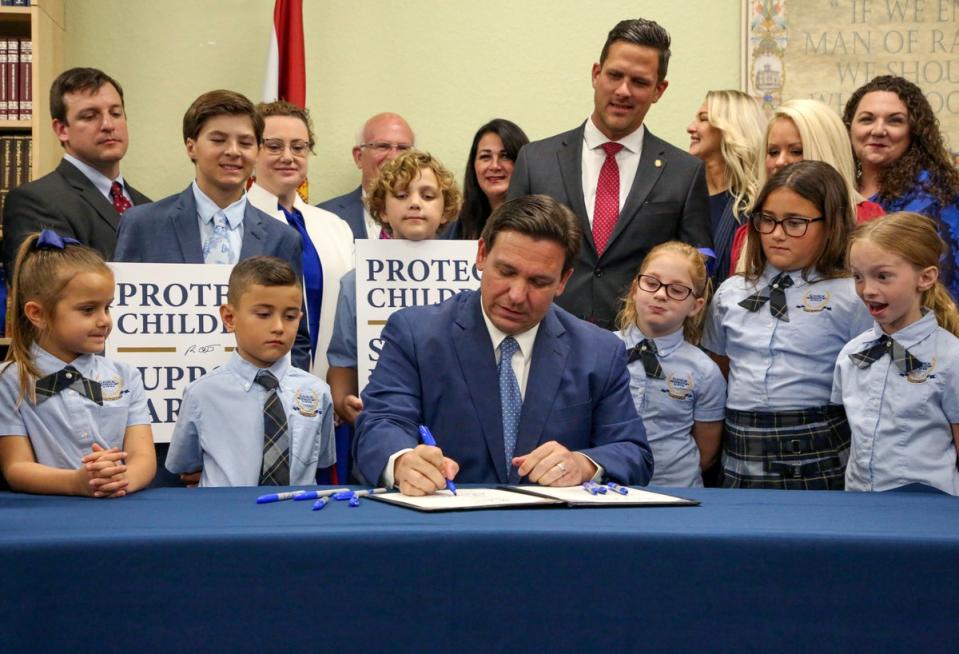Florida’s ‘Don’t Say Gay’ law stripped of ‘most dangerous and discriminatory’ impacts under lawsuit settlement
A signature policy under Florida Governor Ron DeSantis that saw national copycat legislation can’t be used to restrict speech in schools about gender identity and sexual orientation.
Two years after a group of Florida families and LGBT+ civil rights groups sued the state over what opponents have called the “Don’t Say Gay” law, the DeSantis administration reached a settlement on Monday that strips the law’s “most dangerous and discriminatory” impacts, according to plaintiffs.
The settlement requires the state’s Board of Education to instruct every school district that the Parental Rights in Education Act does not block students and teachers from discussing LGBT+ people and issues, nor can the law be used to try to block anti-bullying rules designed to protect LGBT+ people on campus, nor can it be used to break up LGBT+ campus groups.
The terms of the settlement mean that teachers and students can identify themselves as LGBT+, hang Pride flags or post rainbow stickers in classrooms, and discuss LGBT+ people, families, events and topics in school settings without facing threats of legal action.
The law also cannot be applied to library books, as long as those books are not being used in classrooms for “instruction” of subjects sexual orientation or gender identity.
“This settlement not only reaffirms the rights of LGBT+ students and educators to live and speak openly but also marks a significant step towards rectifying the damage inflicted” by the law, according to Nadine Smith, executive director of Equality Florida, among the plaintiffs in the lawsuit.
The settlement “ensures that conversations about LGBT+ identities are not banned from the classroom, promoting a much-needed culture of empathy and acceptance,” according to National Center for Lesbian Rights legal director Shannon Minter.
The DeSantis administration, however, celebrated the outcome as a “major win” against “activists and extremists who mobilised to smear” the law.
The settlement continues to prohibit “classroom instruction” about sexual orientation and gender identity in classrooms – language that plaintiffs and opponents of the law argued was dangerously vague.
“We fought hard to ensure this law couldn’t be maligned in court, as it was in the public arena by the media and large corporate actors,” general counsel Ryan Newman said in a statement. “We are victorious, and Florida’s classrooms will remain a safe place under the Parental Rights in Education Act.”

Signed by the governor in 2022 in the face of international opposition, the text of the so-called “Don’t Say Gay” law states that “classroom instruction by school personnel or third parties on sexual orientation or gender identity may not occur in kindergarten through [third grade]” or “in a manner that is not age appropriate or developmentally appropriate for students in accordance with state standards” in other grades.
In 2023, the governor expanded the law by explicitly including all other grades.
Parents “may bring an action against a school district to obtain a declaratory judgment” and a court may award damages and attorney’s fees if it finds that a school violated the measure, according to the law.
Governor DeSantis and Republican officials argued that the law does not discriminate against LGBT+ people but merely forbids schools from forcing young children to learn about LGBT+ sex and gender transition. Republican legislators, after hours of debate, rejected several amendments that would have explicitly forbidden lessons on sex or classroom instruction about transitioning.
The governor and his allies labelled opposition “woke gender ideology” and smeared critics as “groomers,” fuelling anti-LGBT+ rhetoric and attacks despite argueing that the legislation wasn’t designed to discriminate.
Opponents argued that the text of the bill relies on vaguely written and broad prohibitions on classroom speech while allowing parents to sue school districts over perceived violations, inviting costly investigations and lawsuits targeting teachers that could have a chilling effect on LGBT+ issues and people.
The White House also condemned the law, and students across the state staged walkouts and protests in opposition. Leadership at the Walt Disney Company – among the largest employers in the state – also objected to the law, fuelling a feud between Disney and Mr DeSantis that led to his restructuring of the decades-old governing board for Disney World’s properties.
Republican members of Congress led by now-House Speaker Mike Johnson also proposed a national version of the law, and GOP lawmakers in at least 16 states introduced more than two dozen bills that mirrored Florida’s legislation. Alabama, Arkansas, Indiana, Iowa, Kentucky and North Carolina are among states that enacted such laws.
The DeSantis ally who initially introduced the Parental Rights in Education Act – now-former Republican state representative Joseph Harding – resigned from office after he was indicted for fraud in December 2022. He pled guilty last year.
